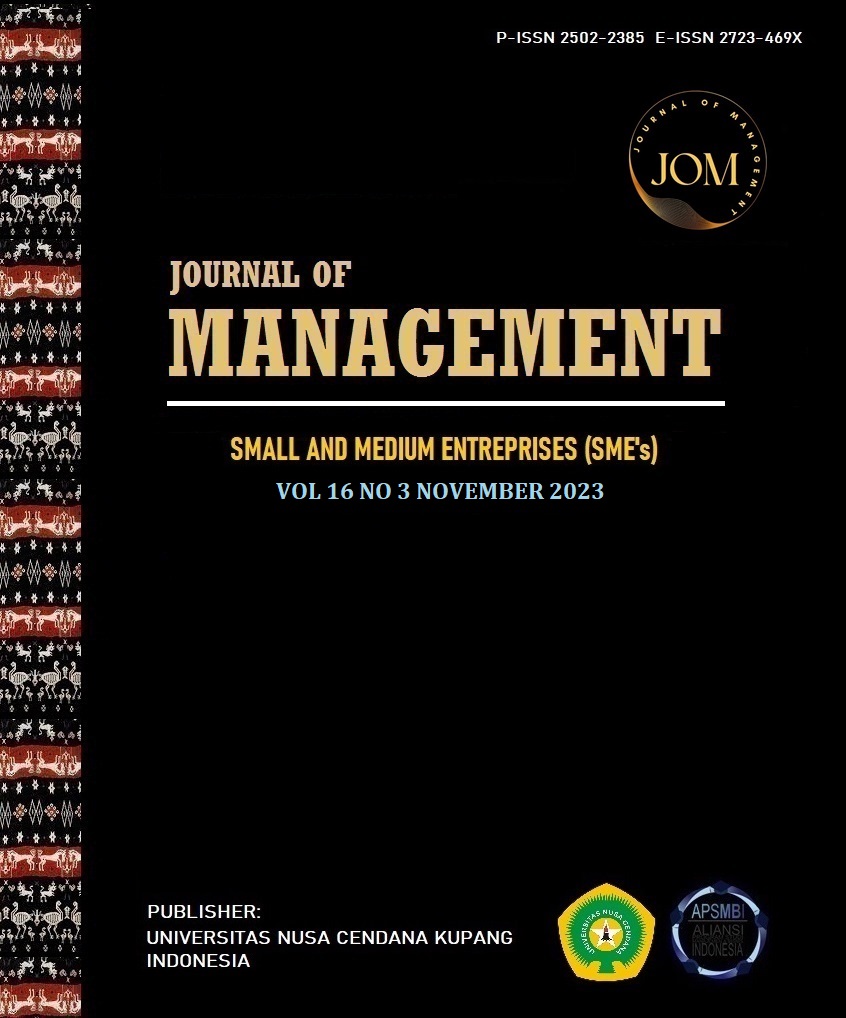ETHICAL ORGANIZATIONAL: IS IT JUST A DISPLAY?
Abstract
The purpose of this research is to find out what are the antecedents and consequences of organizational ethics in the era of Society 5.0 so that they can assist practitioners in making decisions and academics in conducting research related to organizational ethics. This study used a systematic literature review method of 6 articles from the Scopus database relevant to the research problem's formulation. The results show that two factors can influence ethical organizational existence in the era of Society 5.0 i.e. transformational leadership and servant leadership. Meanwhile, the impact of ethical organizational in the organizational system includes moral agency, promotion focus, authentic leadership, work-related stress, employee well-being, creating an ethical organizational, unethical behavior, and job satisfaction. However, this research is still limited to one database and many other things are important to research. So the researcher suggests further research.
Keywords: Organizational Ethics; Organizational Behavior; Era of Society 5.0
Downloads
References
Fladerer, M. P., & Braun, S. (2020). Managers’ Resources for Authentic Leadership – a Multi-study Exploration of Positive Psychological Capacities and Ethical Organizational Climates. British Journal of Management, 31(2), 325–343. https://doi.org/10.1111/1467-8551.12396
Hiekkataipale, M. M., & Lämsä, A. M. (2019). (A)moral Agents in Organisations? The Significance of Ethical Organisation Culture for Middle Managers’ Exercise of Moral Agency in Ethical Problems. Journal of Business Ethics, 155(1), 147–161. https://doi.org/10.1007/s10551-017-3511-9
Khemakhem, H., Fontaine, R., Smaili, N., & Zaman, M. (2023). Whistleblowing regulations and the role of audit committees: insight from interviews. Journal of Management and Governance, 27(1), 131–151. https://doi.org/10.1007/s10997-021-09602-9
Kuenzi, M., Mayer, D. M., & Greenbaum, R. L. (2020). Creating an ethical organizational environment: The relationship between ethical leadership, ethical organizational climate, and unethical behavior. Personnel Psychology, 73(1), 43–71. https://doi.org/10.1111/peps.12356
la Fuente, A. B. de, & Abad-Segura, E. (2023). Exploring research on the management of business ethics. Cuadernos de Gestion, 23(1), 11–21. https://doi.org/10.5295/cdg.221694ea
Riivari, E., & Heikkinen, S. (2022). Virtuousness in Sports Organizations: Examination of Ethical Organizational Culture and Its Virtues. Journal of Global Sport Management, 0(0), 1–27. https://doi.org/10.1080/24704067.2022.2066556
Schwepker, C. H., Valentine, S. R., Giacalone, R. A., & Promislo, M. (2021). Good Barrels Yield Healthy Apples: Organizational Ethics as a Mechanism for Mitigating Work-Related Stress and Promoting Employee Well-Being. Journal of Business Ethics, 174(1), 143–159. https://doi.org/10.1007/s10551-020-04562-w
Shin, M. M., Lee, J., & Chung, J. ho. (2022). Knowledge workers’ existential affirmation and innovativeness: a Kierkegaardian redescription of Drucker. European Journal of Innovation Management, 25(2), 390–412. https://doi.org/10.1108/EJIM-10-2020-0391
Tasoulis, K., Krepapa, A., & Stewart, M. M. (2019). Leadership integrity and the role of human resource management in Greece: Gatekeeper or bystander? Thunderbird International Business Review, 61(3), 491–503. https://doi.org/10.1002/tie.22010
Treviño, L. K., Weaver, G. R., & Reynolds, S. J. (2006). Behavioral ethics in organizations: A review. In Journal of Management (Vol. 32, Issue 6). https://doi.org/10.1177/0149206306294258
Valentine, S. R., Godkin, L., & Fleischman, G. (2023). The Impact of Ethical Forms of Organizational Leadership and Ethical Employment Contexts on Employee Job Satisfaction in Nigerian Hospitality and Recreation Firms. Employee Responsibilities and Rights Journal, 0123456789. https://doi.org/10.1007/s10672-022-09434-1

 Febriyanti Amol(1*)
Febriyanti Amol(1*)



